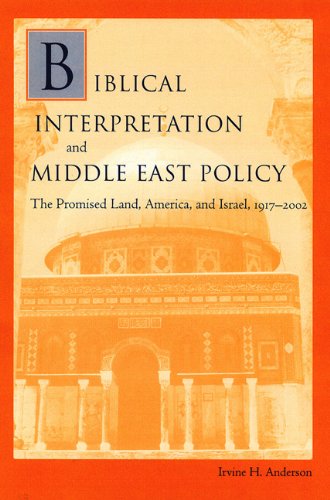Items related to Biblical Interpretation and Middle East Policy: The...
Biblical Interpretation and Middle East Policy: The Promised Land, America, and Israel, 1917-2002 - Hardcover

Synopsis
Irvine Anderson's provocative argument--that fundamentalist interpretations of the Christian Bible have helped create a cultural predisposition that favors returning the Jewish people to the "promised land"--offers an important perspective on British and American foreign policy toward Israel. He asserts that stories about promises of land to the Hebrew people and the "Second Coming of Christ" have made it easier for Zionist and pro-Israel lobbies to be effective in both countries. Starting with analysis of Armageddon theology and the Biblical passages on which these ideas have been based, Anderson shows how they have been disseminated throughout popular culture from the 19th century onward, through Sunday School teaching, novels, and TV evangelism. He then examines the origins of the Balfour Declaration, the travails of the British Mandate in the 1930s, and Truman's decision to hurriedly recognize the newly proclaimed State of Israel--emphasizing the president's Baptist background and intimate knowledge of the Bible. Anderson also discusses the assumption that developed after World War II that Israel was a strategic ally in a dangerous part of the world and he shows that at the time no real countervailing force existed. Among the electorate in both Great Britain and the United States, there was little general knowledge of Islam, Arabs, or the Middle East and limited understanding of the importance of healthy relations with friendly oil-producing states. Adding new information to our understanding of pro-Israel organizations, Anderson illustrates the linkages that developed in the last part of the 20th century between pro-Israel lobbies and the religious right. While acknowledging that this alliance is not the only reason that the American government supports the return of Jews to Palestine, he shows that the influence of conservative teachings and beliefs on policy is and has been profound. This controversial book presents a comprehensive and persuasive discussion of the impact of Christian Zionism in the 20th century. It will be important to historians, sociologists, political scientists, and others interested in the Arab-Israeli conflict.
"synopsis" may belong to another edition of this title.
Book Description
"[An] important and timely topic: the influence of Biblical imagery and Christian messianic hopes on the shaping of British and American policy in the Middle East. . . . Anderson is a careful and judicious historian who presents a balanced and well-nuanced account."--Yaakov Ariel, University of North Carolina, Chapel Hill Irvine Anderson's provocative argument--that fundamentalist interpretations of the Christian Bible have helped create a cultural predisposition that favors returning the Jewish people to the "promised land"--offers an important perspective on British and American foreign policy toward Israel. He asserts that stories about promises of land to the Hebrew people and the "Second Coming of Christ" have made it easier for Zionist and pro-Israel lobbies to be effective in both countries. Starting with analysis of Armageddon theology and the Biblical passages on which these ideas have been based, Anderson shows how they have been disseminated throughout popular culture from the 19th century onward, through Sunday School teaching, novels, and TV evangelism. He then examines the origins of the Balfour Declaration, the travails of the British Mandate in the 1930s, and Truman's decision to hurriedly recognize the newly proclaimed State of Israel--emphasizing the president's Baptist background and intimate knowledge of the Bible. Anderson also discusses the assumption that developed after World War II that Israel was a strategic ally in a dangerous part of the world and he shows that at the time no real countervailing force existed. Among the electorate in both Great Britain and the United States, there was little general knowledge of Islam, Arabs, or the Middle East and limited understanding of the importance of healthy relations with friendly oil-producing states. Adding new information to our understanding of pro-Israel organizations, Anderson illustrates the linkages that developed in the last part of the 20th century between pro-Israel lobbies and the religious right. While acknowledging that this alliance is not the only reason that the American government supports the return of Jews to Palestine, he shows that the influence of conservative teachings and beliefs on policy is and has been profound. This controversial book presents a comprehensive and persuasive discussion of the impact of Christian Zionism in the 20th century. It will be important to historians, sociologists, political scientists, and others interested in the Arab-Israeli conflict.
About the Author
Irvine H. Anderson is a retired professor of American diplomatic history specializing in the Middle East; he formerly taught at the University of Cincinnati. He is the author of Aramco, the United States and Saudi Arabia: A Study in the Dynamics of Foreign Oil Policy, 1933-1950, and The Standard-Vacuum Oil Company and United States East Asian Policy, 1932-1941.
"About this title" may belong to another edition of this title.
- PublisherUniversity Press of Florida
- Publication date2005
- ISBN 10 0813027985
- ISBN 13 9780813027982
- BindingHardcover
- LanguageEnglish
- Edition number1
- Number of pages192
Shipping:
US$ 6.50
Within U.S.A.
Top Search Results from the AbeBooks Marketplace
Biblical Interpretation and Middle East Policy: The Promised Land, America, and Israel, 1917-2002
Seller: Moe's Books, Berkeley, CA, U.S.A.
Hard cover. Condition: Very good. Dust Jacket Condition: Good. Jacket spine is sunned, but readability is not impacted. Upper jacket edge has closed tear. Jacket edges are worn. Spine is tight. Inside is clean and unmarked. Seller Inventory # 1150133
Quantity: 1 available
Biblical Interpretation and Middle East Policy: The Promised Land, America, and Israel, 1917-2002
Seller: The Book Spot, Sioux Falls, SD, U.S.A.
Hardcover. Seller Inventory # Abebooks214283
Quantity: 1 available
